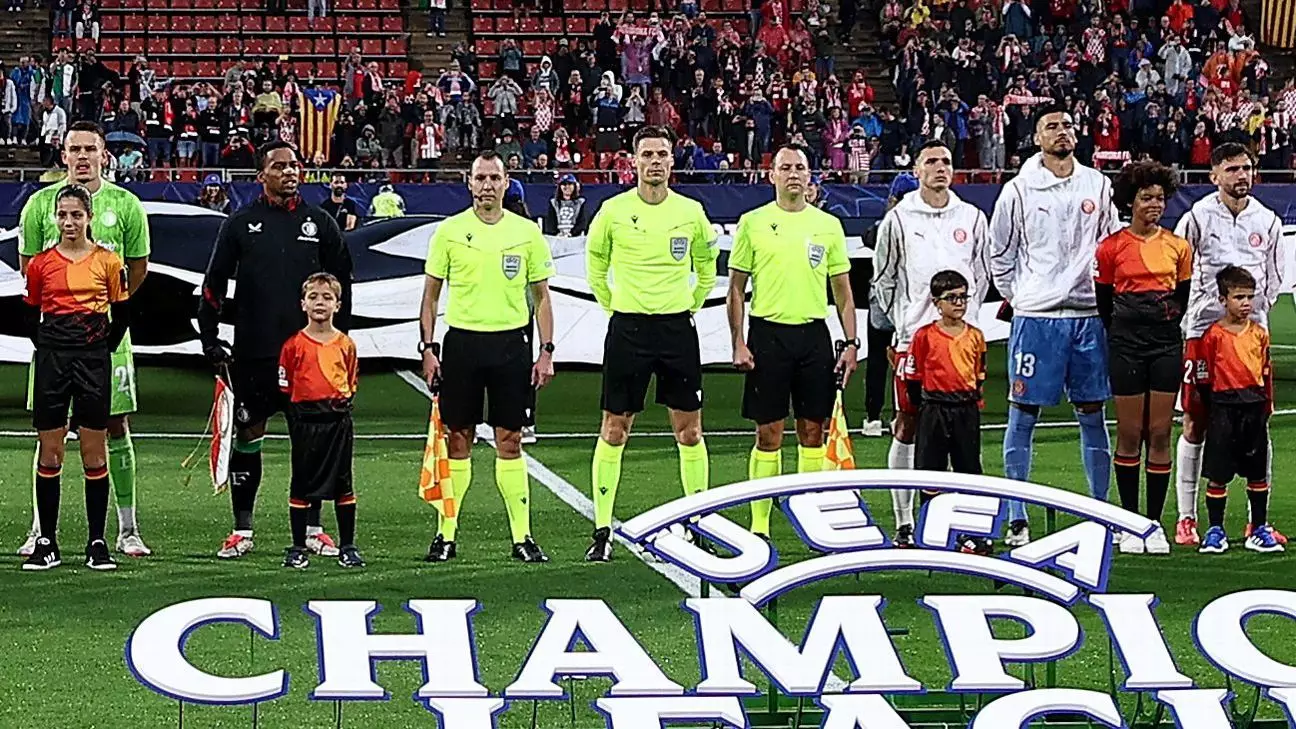The UEFA Champions League is synonymous with thrilling action and breathtaking moments, but a recent matchup between Girona and Feyenoord took chaos to a new level. Played on a rain-soaked evening at Girona’s Montilivi stadium, the match ended with a nail-biting 3-2 victory for the Dutch side. Not only was the game notable for its multi-faceted drama—including two own goals, missed penalties, a disallowed goal, and several contentious decisions—but it also featured a pair of identical twins officiating the game, thus adding a layer of intrigue rarely seen in professional sports.
The Zwicker brothers, Benjamin and Marco, both 38, took on the roles of assistant referees, with Urs Schnyder as the main official. This made for an engaging narrative, as audiences at home and in the stands felt as if they were witnessing an extraordinary twist unfold in real time. Their unique dynamic as identical twins added a layer of spectacle to an already unpredictable encounter, showcasing how sibling connections can transcend the field of play.
The evening kicked off with Girona taking an early lead, only to see the tables turn in an unpredictable manner as Feyenoord capitalized on two own goals from their Spanish counterparts. Just when the game appeared to stabilize at 2-2, a crucial VAR review came into play, disallowing a Girona goal after determining that Donny van de Beek had strayed offside by a matter of centimeters. Such decisions often spark debates among fans and analysts alike, illustrating the intricacies involved in officiating at this elite level.
Additionally, both teams faced the agony of failed penalty attempts, which could have altered the momentum of the match significantly. Feyenoord’s eventual winning goal stemmed from an ironic turn of events, as Girona defender Ladislav Krejcí inadvertently deflected the ball, sealing the win for the visiting side. Such unpredictable occurrences serve as a reminder of both the unpredictability of football and the myriad emotions it can invoke—from jubilation to heartbreak—in a matter of seconds.
While the chaos on the pitch rightly took center stage during this match, it also sheds light on the proven phenomenon of sibling pairs making their mark in the footballing world. From the De Boer brothers, who represent the pinnacle of twin success with their impressive trophy haul and international appearances, to relatively lesser-known sibling pairs, football has long served as a canvas for familial talent.
The Van de Kerkhof brothers are a historical example, having participated in both the 1974 and 1978 World Cups, leaving their imprint on the global stage. More contemporary examples include Megan and Rachael Rapinoe, whose legacy within U.S. women’s soccer highlights not only talent but also determination and fortitude that runs in their family. Similarly, the emergence of Jack and Tyler Fletcher at Manchester United calls to mind the promising generational passage of footballing skills that fans eagerly anticipate.
Twins in football often find themselves embedded within celebrated narratives, and their ability to function both as a unit and as individuals speaks volumes about the sport’s culture, which celebrates not only successes but the bonds that unite players on and off the field.
As we reflect on the chaotic match between Girona and Feyenoord, one cannot help but marvel at how moments like these transcend mere competition. They reinforce the idea that football is more than just a game; it is about community, emotion, and connection. The narrative of twins officiating at such a high level serves as a metaphor for unity—an essential ingredient in both sport and life.
Life as a professional footballer entails navigating both victories and losses, much like the unpredictability witnessed during the match. As fans, players, and officials alike come together to celebrate these milestone moments, we are reminded that the heartbeat of football lies in its capacity to forge connections, leaving an indelible mark on those involved.
The most recent UEFA Champions League match between Girona and Feyenoord stands as a microcosm of football’s dual nature: intense rivalry coupled with the shared human experience, as exemplified by the unique narrative of the Zürcher brothers. As the football world continues to showcase tales of sibling success, we look forward to witnessing more stories that unite and inspire us.

